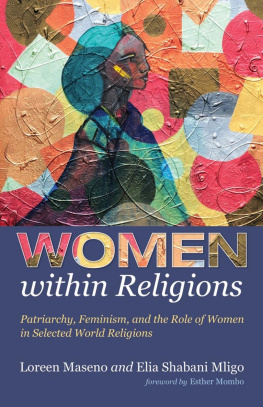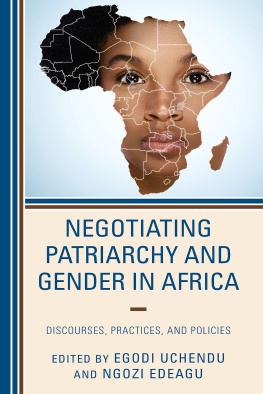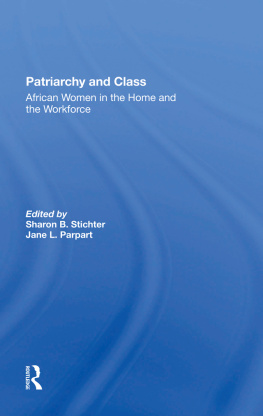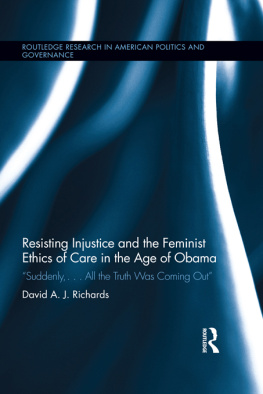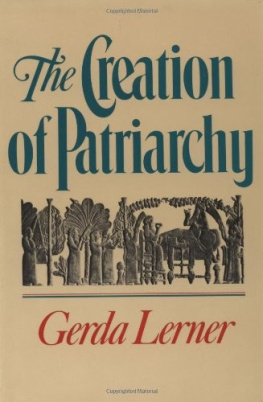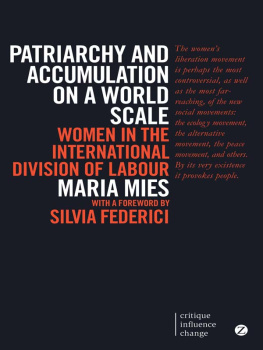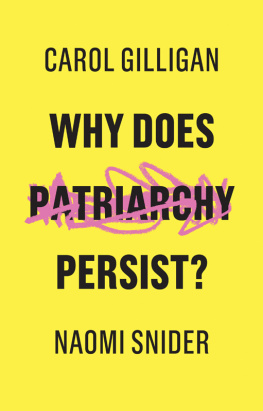
PATRIARCHY
Patriarchy, particularly as embedded in the Old and New Testaments and Roman legal precepts, has been a powerful organising concept with which social order has been understood, maintained, enforced, contested, adjudicated and dreamt about for over two millennia of Western history. This brief book surveys three influential episodes in this history: seventeenth-century debates about absolutism and democracy, nineteenth-century reconstructions of human prehistory, and the broad mobilisations linked to twentieth-century womens movements. It then looks at the way feminist scholars have reconsidered and revised some earlier explanations built around patriarchy. The book concludes with an overview of current uses of the concept of patriarchy from fundamentalist Christian activism, over foreign policy analyses of oppressive regimes, to scholarly debates about forms of effective governance. By treating patriarchy as a powerful tool to think with, rather than a factual description of social relations, the text makes a useful contribution to current social and political thought.
Pavla Miller is Professor of Historical Sociology in the School of Global, Urban and Social Studies at the Royal Melbourne Institute of Technology (Australia).
KEY IDEAS
Series Editor: Peter Hamilton
Designed to compliment the successful Key Sociologists, this series covers the main concepts, issues, debates and controversies in sociology and the social sciences. The series aims to provide authoritative essays on central topics of social science, such as community, power, work, sexuality, inequality, benefits and ideology, class, family, etc. Books adopt a strong individual line, as critical essays rather than literature surveys, offering lively and original treatments of their subject matter. The books will be useful to students and teachers of sociology, political science, economics, psychology, philosophy and geography.
For more information please visit: www.routledge.com/Key-Ideas/book-series/SE0058.
Recent books in the series:
Renewable Energies
Matthias Gross and Rdiger Mautz
Sustainability
Thomas Pfister, Martin Schweighofer and Andr Reichel
Knowledge Second Edition
Is Knowledge Power?
Marian Adolf and Nico Stehr
Sexuality Fourth Edition
Jeffrey Weeks
Social Capital Third Edition
John Field
Patriarchy
Pavla Miller
First published 2017
by Routledge
2 Park Square, Milton Park, Abingdon, Oxon OX14 4RN
and by Routledge
711 Third Avenue, New York, NY 10017
Routledge is an imprint of the Taylor & Francis Group, an informa business
2017 Pavla Miller
The right of Pavla Miller to be identified as author of this work has been asserted by her in accordance with sections 77 and 78 of the Copyright, Designs and Patents Act 1988.
All rights reserved. No part of this book may be reprinted or reproduced or utilised in any form or by any electronic, mechanical, or other means, now known or hereafter invented, including photocopying and recording, or in any information storage or retrieval system, without permission in writing from the publishers.
Trademark notice: Product or corporate names may be trademarks or registered trademarks, and are used only for identification and explanation without intent to infringe.
British Library Cataloguing in Publication Data
A catalogue record for this book is available from the British Library
Library of Congress Cataloging in Publication Data
Names: Miller, Pavla, 1950- author.
Title: Patriarchy / by Pavla Miller.
Description: Milton Park, Abingdon, Oxon ; New York, NY : Routledge, [2017]
Identifiers: LCCN 2016057653| ISBN 9781138692435 (hardback) | ISBN 9781138692442 (pbk.) | ISBN 9781315532370 (ebook)
Subjects: LCSH: Patriarchy.
Classification: LCC GN479.6 .M55 2017 | DDC 321/.1dc23
LC record available at https://lccn.loc.gov/2016057653
ISBN: 978-1-138-69243-5 (hbk)
ISBN: 978-1-138-69244-2 (pbk)
ISBN: 978-1-315-53237-0 (ebk)
To the memory of Mary-Anne Roberts
Many friends, colleagues, students and neighbours contributed to this book. I am grateful to them all. Several deserve particular thanks. Jock McCulloch and his little friend Bernie provided sound scholarly advice and excellent cakes. Des Cahill supplied invaluable advice regarding God and his servants. Julia Adams organised (and her university financed) an invaluable workshop on patrimonialism. Finally, Karen Turner helped make sure the text was accessible.
Most readers opening a book on patriarchy would expect to see a brief overview of the relative position of men and women in society. This would highlight the extent of past and current gender inequalities in different parts of the world, and the extent of violence against women and children. This summary would then be followed by an overview of plausible explanations of this state of affairs, and introduce the concept of patriarchy as a powerful conceptual tool, both for understanding what is going on and attempting to change it. Other readers might expect a thorough feminist critique of just such an approach, pointing out its ethnocentric, historical and theoretical flaws.
This is a different sort of book. It does not try to define what patriarchy really is, or persuade readers to abandon or continue using the concept. Apart from reiterating that the past is extremely complicated, it does not try to provide a systematic overview of how people lived their lives, and women were and are systematically oppressed. Rather, the text explores how the term patriarchy has been used and what conceptual work it was expected to perform. It also considers some of the uses, benefits and drawbacks of using the concept of patriarchy to deal with the present. In brief, the book treats patriarchy as a powerful tool to think with, rather than a factual description of social orders.
What inspired this sort of approach? Some years ago, I wrote a long book dealing with historical transformations of one form of patriarchy into another in Western countries (Miller 1998). Throughout, I was vaguely uneasy about not nailing down precisely what patriarchy was. I promised myself that this would be my next project. I then began reading various detailed feminist definitions. These were not just different but often incompatible; feminist theoreticians valiant attempts to bring them into a coherent system had a lot of merit but finally were not all that convincing. Besides, who was I or anyone else for that matter to try and convince millions of feminists everywhere to use a key concept in one particular way?
As I was pondering all this, attempts to construct grand overarching theoretical explanations went out of academic fashion. However, the work of a number of authors suggested an alternative and exciting way forward. The ones I liked best combined a robust appreciation of social relations in particular times and places with attention to the development and use of important and powerful conceptual tools (see for example Stoler 1995; Chakrabarty 2000; Ortner 1996; Connell 2011). How can such an approach be applied to patriarchy?



